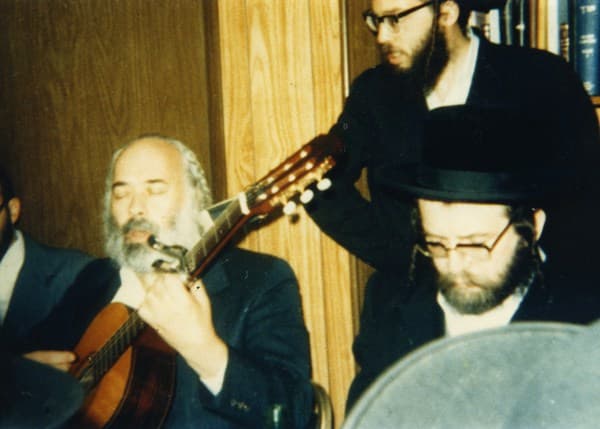His music lives on
The complex symphony of Shlomo Carlebach: 30 years after his death
Rabbi Shlomo Carleabch left a complicated legacy in his wake, but no one can deny the magnificent tunes he left behind, which still pierce our hearts and souls.

Let's be real - if you've ever been in a room where 500 people spontaneously burst into "Am Yisrael Chai," you've felt the Carlebach magic. Twenty-nine years after his death, there's still nothing quite like that moment when a Carlebach niggun catches fire. One person starts humming, others join in, and suddenly the whole room is swaying, stomping, soaring. No lyrics needed, just pure, raw Jewish soul.
Before Carlebach, Jewish prayer could be stiff, formal, a thing of proper cantors and measured responses. He blew that apart. Taking his guitar to Greenwich Village coffeehouses in the '60s, this Orthodox rabbi with a hippie heart created something entirely new - Jewish spiritual music that felt both ancient and electric.
His melodies don't just accompany prayers; they unlock them. Try singing "V'haer Einenu" his way and tell me you don't feel something crack open inside.
The genius was in the simplicity. Carlebach could take the most complex mystical text and turn it into a tune so natural, you'd swear it was handed down at Sinai. His "Ka Echsof" captures centuries of Jewish longing in a few ascending notes. "Return Again" somehow distills the entire concept of teshuvah into a melody you can teach in thirty seconds.
Here's the hard truth though: Carlebach's legacy is stained by numerous, credible allegations of sexual misconduct. Multiple women have come forward with accounts of harassment spanning decades. These aren't vague rumors - they're detailed testimonies from women who were often young, vulnerable, and seeking spiritual guidance. Any honest discussion of Carlebach's impact has to reckon with this darkness.
Yet his melodies persist, because they tapped into something genuine and powerful. Walk into any synagogue today - Orthodox, Conservative, Reform, doesn't matter - and you'll hear Carlebach tunes. They've become such a part of the fabric of Jewish prayer that many singers don't even know they're his. The music has transcended its maker.
Maybe that's fitting. The same tunes that once soundtracked young Jews' spiritual awakening in the Summer of Love now ring out at Shabbat tables from Jerusalem to Jakarta. The melodies that began in smoky coffeehouses now elevate weddings, fuel prayer services, and make ordinary moments sacred.
Thirty years after his passing, Carlebach's music still does what it always did best - it makes Judaism sing.